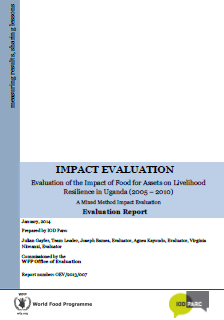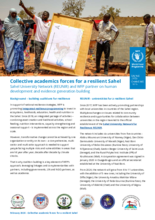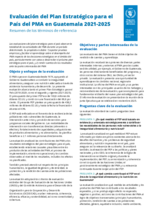
Participants received up to 90 days of food entitlements for asset construction. Using a theory-based approach and mixed methods of document review, household surveys, asset assessments, focus groups, and interviews, the evaluation found that FFA achieved significant short-term benefits in the conflict-transition context.
WFP is acknowledged to have operated at scale in remote dangerous parts of northern Uganda, and as one of the first organisation to shift to recovery programming. Assets, designed appropriately to address immediate needs, were constructed in isolation and dependent on scarce technical partners, contributing only to marginal livelihood gains. The evaluation recommended a corporate roll-out of the FFA guidance, follow-up actions for knowledge-transfer, the development of comprehensive FFA plans, and the inclusion of lessons learned from transitional contexts such as vulnerability-based targeting.



